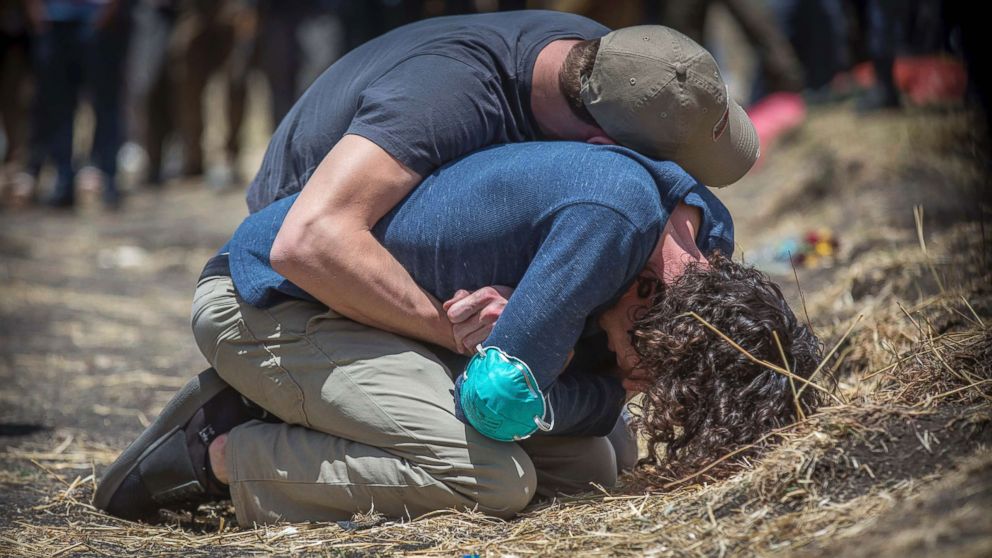
Ethiopia will transport the “black boxes” from Ethiopian Airlines flight 302 to another country, an official announced Wednesday, a decision that will speed up a delay in the analysis of critical flight data that could help explain the second deadly crash of a Boeing 737 MAX 8 plane in just five months.
At the same time, Canada announced it, too, would ground the planes, leaving the U.S. the only major nation not to do so.
Ethiopian officials said the country doesn't have the technology required to analyze the black boxes -- the flight data and cockpit voice recorders -- which hold key information on how and why the plane crashed on Sunday, killing all 157 people on board, ABC News Chief National Correspondent Matt Gutman reported from Ethiopia’s capital of Addis Ababa.
The Ethiopian Civil Aviation Authority was expected to announce which country the recordings will be sent to soon, three days after Sunday's crash.
Any and all details are in high demand by authorities and families of the victims arriving at the crash scene in recent days. Airline customers have also increased pressure with overwhelming concerns about flying on the Boeing 737 MAX 8 until the safety of the plane can be better assured.
The MAX 8 has been grounded by every country or major airline in the world, except the three airlines operating the aircraft in the U.S.: American Airlines, Southwest Airlines and United, which operates a MAX 9, the longer sibling of the MAX 8. Canada was the latest country to ground its MAX jetliners on Wednesday, halting the 41 planes in the country and banning others from entering its airspace. Canada joined the E.U., U.K., and many other countries or airlines in grounding the plane, leaving the U.S. standing virtually alone.
A key question is whether the plane's advanced flight management system -- the autopilot -- might have played a role in the most recent crash as it did in the fatal crash of an Indonesian Airlines 737 MAX 8 last October. In that crash, it appears the pilots failed to disengage the autopilot when the plane's nose began pitching up and down, perhaps because they were unaware of how to do so.
In the aftermath of that crash, at least two U.S. pilots who have flown the Boeing 737 MAX 8 submitted anonymous reports to NASA, which has an aviation safety reporting system, saying their aircraft suddenly pointed its nose downward after they engaged in autopilot. The accounts were first reported by the Dallas Morning News and obtained by ABC News from NASA.
The pilots disengaged the autopilot, manually corrected the unexpected motion and continued to climb as planned. The flight continued uneventfully after that. It’s unclear from the reports if the pilots were both on the same flight or on two separate flights.
In a third report, a pilot reported feeling like the flight manual and training for the Boeing 737 MAX wasn't sufficient.
As of Tuesday, just over 700 Boeing 737 MAX flights were tracked by FlightRadar24 — down from over 1,200 Boeing 737 MAX flights tracked each day in the week leading up to the crash Sunday.
The U.S., home to 72 of the Boeing 737 MAX 8 aircraft, has gone against the grain in keeping planes in the air, backed by the continued confidence of the Federal Aviation Administration and Boeing.
In addition to Canada's announcement to ground the jets Wednesday, the European Union and the U.K. stopped or banned all Boeing 737 MAX 8 operations on Tuesday, following the decisions of Singapore, Australia, Malaysia, Oman and Ireland to ban the plane from flying in and out of those countries.
President Donald Trump spoke by phone with Boeing CEO Dennis Muilenburg Tuesday, White House spokesman Judd Deere confirmed, but he released no other details other than to say "we are continuing to monitor the situation."
On Tuesday evening, Boeing confirmed the conversation to ABC News and said that Muilenburg reiterated to the president "our position that the MAX aircraft is safe."
Also on Tuesday evening, acting Federal Aviation Administration Administrator Daniel Elwell said in a statement that the agency continues to extensively review all available data and aggregate safety performance information from operators and pilots, but that, "Thus far, our review shows no systemic performance issues and provides no basis to order grounding the aircraft."
"In the course of our urgent review of data on the Ethiopian Airlines Flight 302 crash, if any issues affecting the continued airworthiness of the aircraft are identified, the FAA will take immediate and appropriate action," Elwell's statement concluded.
ABC News' Matt Gutman, Robert Zepeda, David Kerley and Jeffrey Cook contributed to this report.
from ABC News: Politics https://ift.tt/2CgbidC
0 Response to "After delay, Ethiopia to send Boeing 737 MAX 8 'black boxes' abroad for analysis"
Posting Komentar